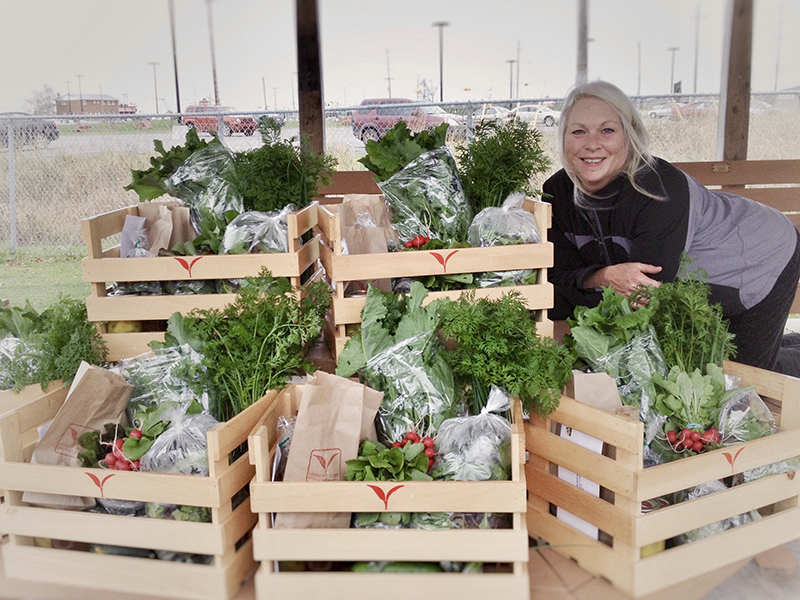Growing better not bigger with Little Victory MicroFarms
Forget about “making it big.” Micro is the new macro, nano the new giga. For mother- daughter duo Tara Callaghan and Debi Stevenson, when it comes to growing high quality produce, small is mighty. In fact, little IS the goal! With small plots in New Glasgow and a large backyard in East Royalty, Little Victory MicroFarms sparks a conversation about what it takes to grow a successful farming business on PEI.
Three years ago, Callaghan, a landscape architect, and her mother, Stevenson, a long-time hobby gardener broke ground at Little Victory MicroFarms, launching a Community Supported Agriculture (CSA) program.
Using a model of agriculture known as SPIN (Small Plot Intensive) developed in Saskatchewan, the farm enterprise embraces the ‘small is beautiful’ philosophy with zeal. “SPIN offers a critical approach to agriculture by challenging what it means to grow on a commercial scale,” said Callaghan, citing the model’s emphasis on using urban backyards and neighbourhoods to design for profitable farming landscapes.

submitted photo: Little Victory MicroFarms
The underpinning characteristics of the SPIN model have allowed Callaghan and Stevenson to manage and mitigate some of the complexities that come with owning a CSA farm operation on PEI, including being at mercy to the elements and finding local markets.
Becoming a profitable venture has been an experimental process of figuring out Little Victory MicroFarms’ formula for survival of the smallest. Learning how to manage and mitigate challenges specific to their farms and markets has taken creative troubleshooting. Stop watches, insect netting, ergonomic picking, staggered harvesting, irrigation systems, row covers, and caterpillar tunnels are just a few of the creative solutions they’re employing to troubleshoot problems all too familiar to small-scale farmers on PEI.
Its unique three-tiered CSA pricing system and involvement in local and wholesale markets reinforces Little Victory MicroFarms’ belief that creativity and flexibility matter in all facets of their venture. Customers can choose to sign up for weekly baskets of produce over 6, 12 or 18 week periods beginning in late June through mid-October. This staggered system is ideal for seasonal and long term residents alike. Appealing to those who want to test the CSA waters with a short-term commitment as well as those who are ready to dive in deep for a full seasons’ worth of fresh local vegetables.

submitted photo: Little Victory MicroFarms
Perhaps not unlike many young, repatriating Islanders, Callaghan felt that returning to PEI after working off-island for a few years was a risk. Fortunately, it was a risk that she was not only willing but excited to take.
“It really wasn’t [a difficult decision]. I was eager to come back and pick up where I left off. I guess the hard part is the risk involved in leaving a steady 9 to 5 job to go into the uncertainty of running your own small business. But it sure feels great to be going after what you want, and doing it with someone you love!”
Callaghan and her mother work passionately alongside one another in their microfarms to restore health to the Island soil “one shovel at a time.” For these two stewardesses it’s the little victories in farming that keep them coming back season after season.

Callaghan (L) and Stevenson (R), co-owners of Little Victory MicroFarms submitted photo: Little Victory MicroFarms
- PRACTICAL HOME COOKING TIPS - December 1, 2018
- PEI HOSTS ANNUAL REGIONAL ORGANIC CONFERENCE - November 1, 2018
- Organics on the Menu? - October 1, 2018
- TAKING PIZZA ON THE ROAD - August 1, 2018
- ATLANTIC CANADA’S LARGEST ORGANIC GREENHOUSE - July 1, 2018
- Bluefield High Hosts AG for Life Dinner - June 1, 2018
- Organic Consumer Buying Guide: Summer 2018 - June 1, 2018
- FILLING THE FARM LABOUR GAP - May 1, 2018
- A YOUTH-LED ENTERPRISE - March 1, 2018
- THE BEST OF BOTH WORLDS - February 1, 2018


